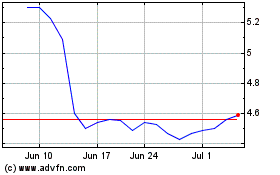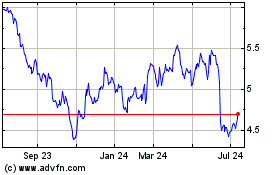Porsche Discontinues Use of Diesel Engines -- WSJ
September 24 2018 - 3:02AM
Dow Jones News
By Ruth Bender
This article is being republished as part of our daily
reproduction of WSJ.com articles that also appeared in the U.S.
print edition of The Wall Street Journal (September 24, 2018).
BERLIN -- German luxury car maker Porsche AG will no longer
offer diesel versions of its cars, the Volkswagen AG unit said
Sunday, becoming the first German auto maker to drop the engines in
the wake of the emissions-cheating scandal.
"As a sports-car maker where diesel has traditionally played an
inferior role, we have come to the conviction that we'll continue
without diesel, " Porsche said in a statement.
Porsche's decision highlights a growing trend among premium auto
manufacturers to focus resources on the rise of plug-in hybrid and
full-battery electric vehicles over the next decade, rather than on
developing diesel in face of rising costs of developing combustion
engines that meet ever-stricter emissions regulations.
The decision also comes as diesel car sales have plunged as part
of a wider backlash of the emissions-cheating scandal with European
cities beginning to ban older diesel models from their roads to
meet emissions reductions targets.
In an interview with German weekly Bild am Sonntag, which first
reported Porsche's decision, Chief Executive Oliver Blume said that
Porsche's image had suffered in the wake of the Volkswagen
emissions-cheating scandal.
"The diesel crisis has caused us a lot of trouble," he said,
adding that was is the reason the car maker wants to focus on
petrol and hybrids -- and from 2019 all-electric vehicles as
well.
Porsche-parent Volkswagen has pleaded guilty to conspiracy to
defraud the U.S. government over emissions levels for its diesel
cars. The company's cheating came to light in September 2015, when
Volkswagen admitted some 11 million of its diesel vehicles
world-wide were equipped with software that allowed them to
sidestep emissions testing.
Porsche had been weighing the decision to drop diesel engines
since the beginning of the scandal.
Diesel models at Porsche have been on a decline in recent years
while demand for hybrid models is surging, Porsche said. In 2017,
12% of Porsche cars globally were diesel-powered while in Europe
63% of the Porsche Panamera are already hybrid models. Porsche
hasn't had a diesel model in its portfolio since February 2018, the
company said.
Porsche is investing over EUR6 billion ($7 billion) into hybrid
and electric mobility technology until 2022. Every other new
Porsche car will likely be electrically-powered by 2025, either as
a hybrid or fully electric, the company said.
Some car makers have taken even more radical steps. Volvo last
year said that all models from 2019 would be either fully electric
or a hybrid as the Chinese-owned auto maker became the first major
auto maker to announce it would phase out combustion-engine only
vehicles that have dominated the industry for decades.
Porsche, however, added that is wasn't "demonizing diesel." "It
is and will remain an important propulsion technology," Porsche
said, adding that it will continue to service holders of Porsche
diesel models.
William Boston contributed to this article.
Write to Ruth Bender at Ruth.Bender@wsj.com
(END) Dow Jones Newswires
September 24, 2018 02:47 ET (06:47 GMT)
Copyright (c) 2018 Dow Jones & Company, Inc.
Porsche Automobile (PK) (USOTC:POAHY)
Historical Stock Chart
From Mar 2024 to Apr 2024

Porsche Automobile (PK) (USOTC:POAHY)
Historical Stock Chart
From Apr 2023 to Apr 2024
